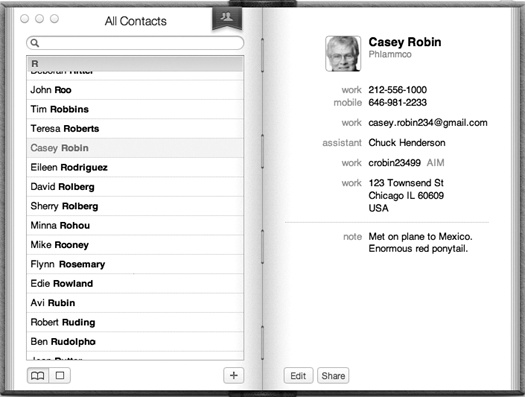Contacts (Address Book)
Contacts is OS X’s little-black-book program—an electronic Rolodex where you can stash the names, job titles, addresses, phone numbers, email addresses, and Internet chat screen names of all the people in your life. It can also hold related information, like birthdays, anniversaries, and any other tidbits of personal data you’d like to keep at your fingertips (Figure 11-14).

Figure 11-14. Contacts is meant to look like a physical address book. On the left, the full list of names; on the right, the card for the one person whose name you’ve clicked. (You can hide the names list by choosing View→Card Only, or bring it back with View→List and Card.)
The best part: It’s centralized. This one address list appears everywhere: in Mail, Messages, and so on. And it synchronizes with your iPhone, iPad, and (via iCloud) your other computers.
Tip
Back in Mountain Lion, Apple changed the name of this program from “Address Book” to “Contacts.” Why? To make it match the program’s name as it appears on the iPhone and the iPad, of course.
By the way: If you find yourself accidentally typing “address book” into the Spotlight search feature from force of habit, you’ll be pleased to discover that “Contacts” is the first search result. Apple’s got your back.
Once you make Contacts the central repository of all your personal contact information, you can call up this information in a number ...
Get Switching to the Mac: The Missing Manual, Mavericks Edition now with the O’Reilly learning platform.
O’Reilly members experience books, live events, courses curated by job role, and more from O’Reilly and nearly 200 top publishers.

